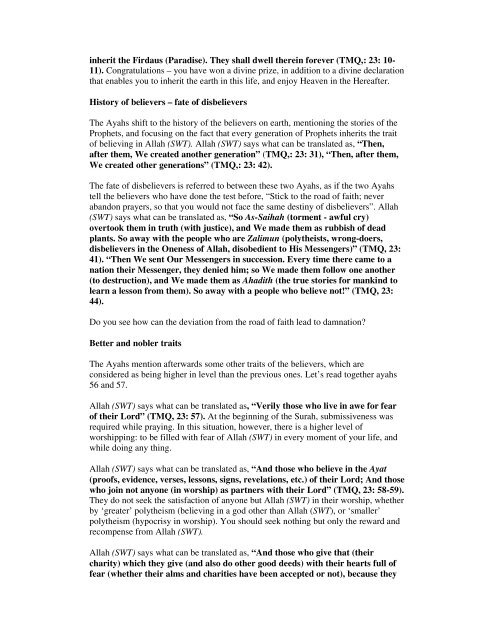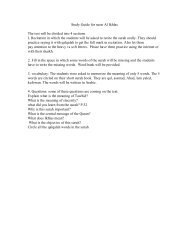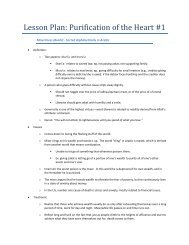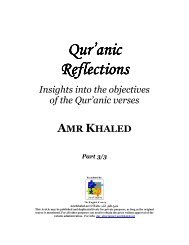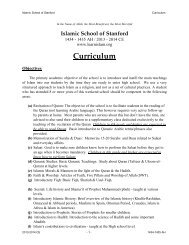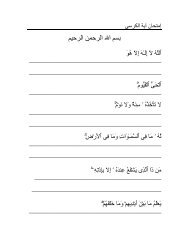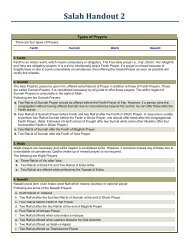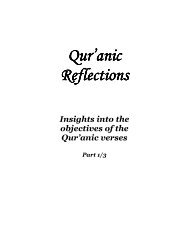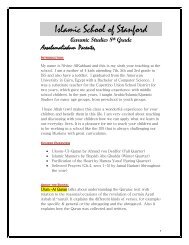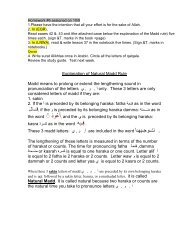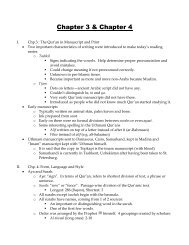Quranic Reflections - Islamic School of Stanford
Quranic Reflections - Islamic School of Stanford
Quranic Reflections - Islamic School of Stanford
Create successful ePaper yourself
Turn your PDF publications into a flip-book with our unique Google optimized e-Paper software.
inherit the Firdaus (Paradise). They shall dwell therein forever (TMQ,: 23: 10-<br />
11). Congratulations – you have won a divine prize, in addition to a divine declaration<br />
that enables you to inherit the earth in this life, and enjoy Heaven in the Hereafter.<br />
History <strong>of</strong> believers – fate <strong>of</strong> disbelievers<br />
The Ayahs shift to the history <strong>of</strong> the believers on earth, mentioning the stories <strong>of</strong> the<br />
Prophets, and focusing on the fact that every generation <strong>of</strong> Prophets inherits the trait<br />
<strong>of</strong> believing in Allah (SWT). Allah (SWT) says what can be translated as, “Then,<br />
after them, We created another generation” (TMQ,: 23: 31), “Then, after them,<br />
We created other generations” (TMQ,: 23: 42).<br />
The fate <strong>of</strong> disbelievers is referred to between these two Ayahs, as if the two Ayahs<br />
tell the believers who have done the test before, “Stick to the road <strong>of</strong> faith; never<br />
abandon prayers, so that you would not face the same destiny <strong>of</strong> disbelievers”. Allah<br />
(SWT) says what can be translated as, “So As-Saihah (torment - awful cry)<br />
overtook them in truth (with justice), and We made them as rubbish <strong>of</strong> dead<br />
plants. So away with the people who are Zalimun (polytheists, wrong-doers,<br />
disbelievers in the Oneness <strong>of</strong> Allah, disobedient to His Messengers)” (TMQ, 23:<br />
41). “Then We sent Our Messengers in succession. Every time there came to a<br />
nation their Messenger, they denied him; so We made them follow one another<br />
(to destruction), and We made them as Ahadith (the true stories for mankind to<br />
learn a lesson from them). So away with a people who believe not!” (TMQ, 23:<br />
44).<br />
Do you see how can the deviation from the road <strong>of</strong> faith lead to damnation<br />
Better and nobler traits<br />
The Ayahs mention afterwards some other traits <strong>of</strong> the believers, which are<br />
considered as being higher in level than the previous ones. Let’s read together ayahs<br />
56 and 57.<br />
Allah (SWT) says what can be translated as, “Verily those who live in awe for fear<br />
<strong>of</strong> their Lord” (TMQ, 23: 57). At the beginning <strong>of</strong> the Surah, submissiveness was<br />
required while praying. In this situation, however, there is a higher level <strong>of</strong><br />
worshipping: to be filled with fear <strong>of</strong> Allah (SWT) in every moment <strong>of</strong> your life, and<br />
while doing any thing.<br />
Allah (SWT) says what can be translated as, “And those who believe in the Ayat<br />
(pro<strong>of</strong>s, evidence, verses, lessons, signs, revelations, etc.) <strong>of</strong> their Lord; And those<br />
who join not anyone (in worship) as partners with their Lord” (TMQ, 23: 58-59).<br />
They do not seek the satisfaction <strong>of</strong> anyone but Allah (SWT) in their worship, whether<br />
by ‘greater’ polytheism (believing in a god other than Allah (SWT), or ‘smaller’<br />
polytheism (hypocrisy in worship). You should seek nothing but only the reward and<br />
recompense from Allah (SWT).<br />
Allah (SWT) says what can be translated as, “And those who give that (their<br />
charity) which they give (and also do other good deeds) with their hearts full <strong>of</strong><br />
fear (whether their alms and charities have been accepted or not), because they


